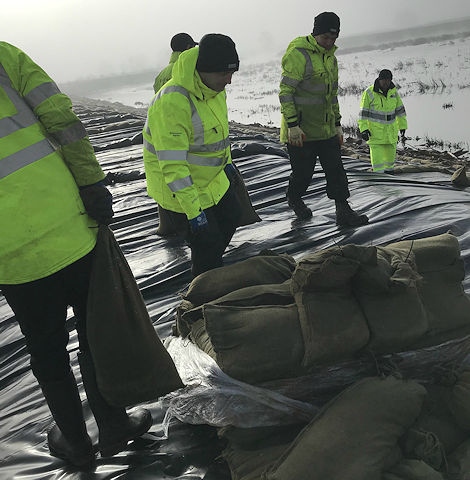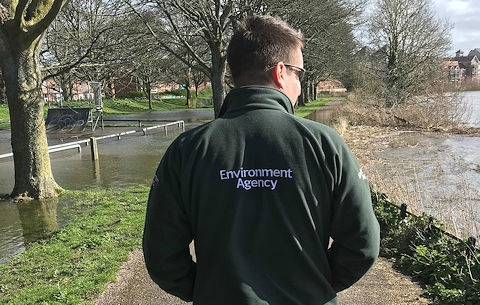A cleaner and greener borough with the Environment Agency
Date published: 18 March 2020

Environment Agency logo
Hello from everyone at the Environment Agency and welcome to our latest round-up exclusively for Rochdale Online.
It’s been an extraordinary start to the year weather-wise with the Met Office now releasing data showing that February 2020 was the wettest February on record for England and the fifth wettest of any calendar month since 1862! In England 154.9mm rainfall fell, 258% of the average rainfall for the month. When the Met Office produce rainfall data, their maps usually record up to 200% of average rainfall. Last month, they had to create a new scale above 400% for some areas.
Greater Manchester saw some of the worst impacts and this month, we are using our round-up to take a look back at our response to the flooding that fell across many of our catchments and how we are now moving forward with recovery.
Recovery work goes on after heavy flooding
Storms Ciara and Dennis swept across the UK over two consecutive weekends in February and brought heavy rain and gusts of up to 97mph causing widespread flooding and major disruption on the transport network.
Extremely high and intense rainfall ranging between 40 and 80mm in 24 hours was seen across much of northern England with particularly severe impacts being along the River Irwell catchment in Greater Manchester. Highest or second highest river levels on record were reached on 13 rivers including the Aire and Calder in Yorkshire and the Severn and Teme in Shropshire. In the the Upper Irwell river levels during Storm Ciara were second highest recorded at many gauges (Irwell Vale, Bury Ground, Littleborough, Blackford Bridge, Kearsley) and third highest at Manchester Racecourse (Salford)

The Environment Agency’s defences protected at least 47,725 properties and businesses across Greater Manchester, Merseyside and Cheshire and we were able to warn around 13,500 people well in advance before the arrival of the storms. Unfortunately at least 150 properties across Greater Manchester still fell victim to the misery of flooding.
To those people that did suffer flooding, those properties are not just bricks and mortar on a map, they are their homes or businesses and every drop of flood water that came through their doors is a tragedy.
The experience of having your home or business flooded is hugely distressing. The emotional and economic damage cannot be scrubbed away with the mud. This month, our teams have met communities coping with the worst of the impacts and their grief is profound.
Our role is to make our communities more resilient to flooding so that when it does happen it poses much less risk to people, does much less damage, and life can get back to normal much quicker. In recent weeks, our Community Information Officers have visited towns across Greater Manchester offering information to residents as well as signposting people to help and advice.
Our Operational Teams are also back out on the ground implementing a well-tested programme of prevention, planning, response and recovery work as well as carrying out detailed assessments of our assets and rivers to ensure our communities are as flood resilient as they can possibly be.

Our experience of responding to severe weather events across Greater Manchester in recent years meant that we were also ready to react during the flooding incidents. Both our Warrington based Incident Room and our Operational Teams out on the ground provided a non-stop service, both day and night, to our partners, emergency services and affected communities.
During this time, 213 area staff worked a total of 2,606 hours in our incident room or were mobilised on the ground to operate flood defences and temporary pumps, clear debris from rivers and inspect flood defences to ensure they were ready to respond as needed.

In Rochdale, our teams operated pumps alongside the local authority when a culvert at Stanney Brook in Woodland View, collapsed kept the rivers free of blockages (one of the most common causes of flooding) by clearing tens of tonnes of debris from 248 screens and grids across the community.

As people may have seen on ITV’s “Britain Underwater” this week, we are continually preparing for the worst even during 'peace time'. During the documentary, our Confined Spaces Team invited the camera crew into one of the many culverts we maintain across Greater Manchester to showcase why the routine inspections and regular maintenance activity our team undertake 24 hours a day, 365 days of the year is so important to prevent flood risk to our communities.
If you have not watched it yet, we certainly recommend downloading it on catch up, not just to see Confined Spaces team member, Carl coining a new catchphrase before he enters the culvert, but also to get an idea of the devastation flooding can cause to people’s lives.

Taking the next step in flood risk management for Rochdale
Following the recent flooding incidents, it seems timely for the project team to update you around work on the proposed flood scheme in Rochdale and Littleborough. The good news is it’s progressing well. The Planning Application for Littleborough Phase 1a was submitted in late January.
The team met with the local community at a drop in-in early February at Hare Hill House to share further details of the proposed works and received plenty of feedback and questions from residents.
Going forward, the project continues to develop plans for Phase 1b, which involves further works in Littleborough and we expect to submit a planning app for those works later this year. The project will begin detailed design for Rochdale this summer.
Once completed, the future flood scheme will increase the level of protection to 1,000 residential properties as well as critical infrastructure such as the tram network, bus station, a grid sub-station as well as a waste water treatment works.
As always, it is worth noting, that even with flood defences in place, you can never entirely remove the risk of flooding.
Last month’s wet weather has reminded us all of the importance of being prepared and you can check your risk as well as signing up for free flood warnings by phoning Floodline, on 0345 988 1188, or by going online: www.gov.uk/sign-up-for-flood-warnings
Using a mosaic of methods to tackle flood risk
Flooding, and managing it, costs the UK around £2.2 billion each year. The most well-known risk reducer is, of course, flood alleviation schemes and Greater Manchester, Merseyside and Cheshire benefit from several extensive and complex flood defences with several more planned for the region by 2021. These defences provide us with an ‘adaptable strategy’ to manage future risk depending on how conditions, such as river levels, change over time.
However, the climate emergency means we are going to see more of the types of storms we have seen this year. Hard concrete defences are key to our response, but we can’t build limitlessly high walls and barriers. We now need to look to nature to build a mosaic of measures to combat against it.
In the headwater catchment upstream of Rochdale, there is a partnership project with Rochdale Metropolitan Borough Council, to trap and slow the flow of floodwater.
The project, is delivering on the ground Natural Flood Management interventions, such as leaky woody barriers on small watercourses, and raised earth “bunds” in other locations, to temporarily store storm flood peaks to help reduce the risk of flooding to communities downstream.
Such interventions can help store carbon and create wildlife benefits, and if we can upscale it, the benefits could be considerable. The project is working in conjunction with the £46m flood scheme downstream. Together, the two parts are both necessary cogs of the mosaic of techniques required to reduce flood risk and work with the environment.

Spreading the word: Observe, but don't disturb
Routine maintenance of our flood assets is an ongoing programme of works and we are now entering a time of year where we have to be particularly careful. From the beginning of March bird nesting season starts which means we have to ensure that we do not disturb birds or their nests until their chicks have fledged.
Disturbing nesting birds is an offence under the Wildlife and Countryside Act 1981 which can result in a £5,000 fine and up to two years in prison so we have to make sure our works do not harm them. The same law applies to everyone and is enforced by the police so it’s definitely a good idea to think carefully when carrying out any gardening at this time of year.
Don’t forget to say hello
Have you spotted Team EA out and about? Aside from incident response, in the past month in Rochdale, the team have been busy carrying out routine maintenance on our assets on the River Roch, the River Beal and Stanney Brook.
If you do see us out and about in the Rochdale community don’t forget to say hello or give us a wave! We love interacting with the communities we serve and it really does brighten our day to talk to you.
Stay in touch
You can stay up-to-date with the latest news and information from the Environment Agency on Twitter and Instagram at @EnvAgencyNW.
We look forward to sharing more of our stories and successes with you next time.
Do you have a story for us?
Let us know by emailing news@rochdaleonline.co.uk
All contact will be treated in confidence.
Most Viewed News Stories
- 1Drugs and cash seized during morning raids at suspected stash houses
- 2Middleton school hails another outstanding inspection result
- 3Ogden family announces intention to invest £2m in Rochdale AFC
- 4Former councillor and hospital campaigner Jean Ashworth has died
- 5Man convicted after police car filmed driving dangerously in Kirkholt
To contact the Rochdale Online news desk, email news@rochdaleonline.co.uk or visit our news submission page.
To get the latest news on your desktop or mobile, follow Rochdale Online on Twitter and Facebook.


